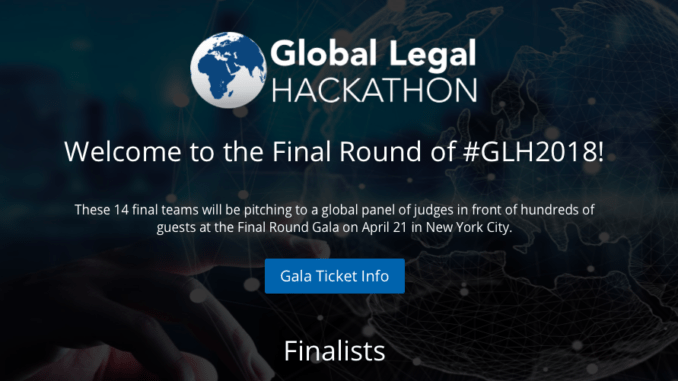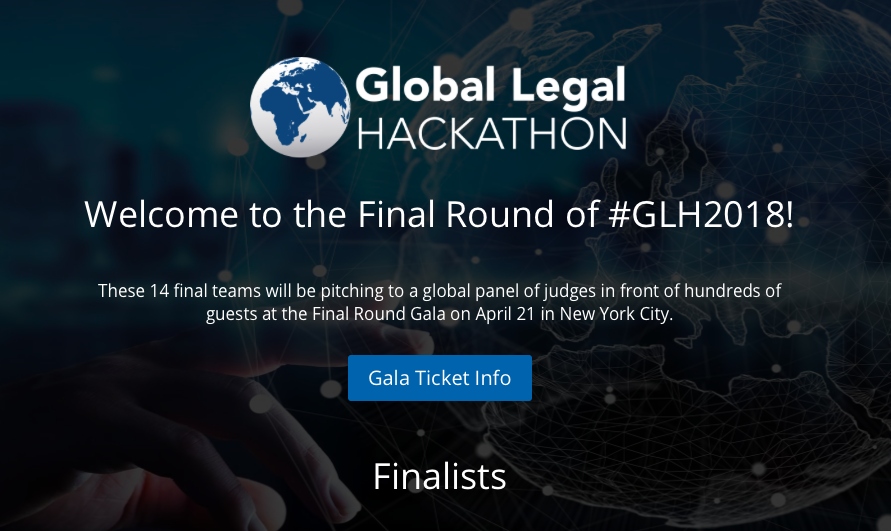
The culmination of the Global Legal Hackathon (GLH) has finally arrived, with the ultimate winner of the worldwide innovation event to be decided at a gala event in New York on 21 April, billed as a celebration of global legal innovation around the planet.
A panel of six independent judges will decide which of the 14 teams that have made it through to the final will be recognised as the GLH Winner 2018 following a weekend hackathon that took place around the world in February in 40 cities, across 22 countries.
Co-organiser of the GLH, Aileen Schultz told Artificial Lawyer: ‘The entire legal innovation community is invited to witness [the final] in New York.’
‘The 14 teams that made it through to the finals will be pitching to the global panel of judges, with teams focusing on both public and private benefit solutions,’ she added.
Some of the judges named so far include: George Beaton, the well-known Australian ‘NewLaw’ evangelist and legal management consultant; Michał Paprocki, the General Manager at ING Tech Poland; and Esther Dediashvili, Legal Knowledge Manager, Head of Legal Technology Implementation at Israeli law firm, FBC & Co.

And it’s worth having a look through the teams and their solutions below to get a sense of the breadth of applications (see list below).
One thing that strikes Artificial Lawyer is that far from being pie in the sky tech ideas that don’t relate to the real world, the finalists have developed solutions that address very real world issues, often with an access to justice need in mind.
The aim for most of these teams has not been to try and provide a total solution, but pragmatically to try and solve one part of the ‘legal production chain’. In several cases the focus is also on tech enabling better access to human lawyers. And, although the GLH has been created by David Fisher, founder and CEO of Integra Ledger, the legal blockchain platform, the use of distributed ledger technology is not central to most of the teams’ solutions. However, there are several solutions involving machine learning and NLP, which is great to see.
Overall, what the GLH has done is: to engage a broad range of people around the world in legal technology; brought people together who may not have been involved in legal tech before; helped to educate and share ideas globally; break down silos; and generally to promote the use of legal tech as a means to an end, i.e. solving bottlenecks, efficiency problems and access to justice issues that otherwise may not be solved using ‘traditional’ methods. And that has to be a good thing.
It’s been a real pleasure covering this initiative from its start last year to its finish this month and Artificial Lawyer looks forward to seeing what happens next year – no doubt it will be even bigger!
–
The list of the Final 14 Teams that will pitch in New York
Australia – Melbourne
Anika
ANIKA is a solution designed to improve access to justice and provide practical legal training to law students. ANIKA will connect clients seeking legal advice with law students, who will work with ANIKA’s artificial intelligence and human supervising lawyers to provide free, high-quality legal advice.
Brazil – Florianópolis
Apresente-se
“Apresente-se” is a legal platform accessed by the courts and police that allows people to be identified, located and registered remotely from common mobile devices
Canada – Montréal, QC
Juridico
A solidarity cooperative that brings together a community of litigants, jurists and workers for a common objective: making the judicial process easier. A web platform that offers customized help and orientation to the public, providing referrals to relevant legal ressources.
Canada – Ottawa, ON
2Sign
An app for producing quick and easy legal contracts using verbal answers.
China – Hong Kong
Decoding Law
Decoding Law is a machine learning powered browser plugin that helps people read and understand legislation. It (1) finds people the relevant section(s) of legislation by identifying keywords in their questions, (2) explains defined terms for easier navigation and (3) breaks down complex legislative drafting into simple language, which is particularly useful to unrepresented litigants.
Germany – Berlin
sondier.ai
Sondier.ai is a consensus finding engine that facilitates a new and innovative way of conflict resolution.
Hungary – Budapest
Closers
Your digital footprint. Revealed. Revealu makes it super-simple to request your GDPR data from providers such as Google, Facebook or anyone else.
Nigeria – Lagos
Team Lemon
Project LemonAid aims to electronically facilitate access to criminal justice by decreasing the turnaround time for delivery of pro-bono legal services through collating, analyzing, and collaborating on existing case data.
Singapore – Singapore
Regall
Regall LT provides AI support to businesses and law firms to make wading through documents a breeze. It’s early days yet, but we are aiming to make wading through documentation easier and painless for lawyers and businesses so that you can focus on the work that truly matters. Our AI automatically scans, tags documents and maps inter document references to make your life a breeze.
USA – Cleveland, OH
INCO-herent
Our mission is to provide a clear understanding of how to choose and verify appropriate use of INCOterms when buying or selling across international borders to more accurately capture costs and risks. INCOtelligent smart contracts help your business navigate INCOterms for international purchasing contracts. By using a set of guided questions, INCOtelligent smart contracts help you select the right INCOterm for your business.
USA – Denver, CO
LexLucid
LexLucid is an online community for attorneys to review consumer contracts online, enabling consumers to make educated decisions about the products and services they use, and encouraging businesses to make their contracts fair.
USA – Los Angeles, CA
HelpSelf
Clear My MJ is TurboTax for expungements. Our guided interview can be done on web, mobile or by SMS messaging, and issues the documents that need to be filed for an expungement; a crucial tool to solve our country’s access to justice gap. Our mail API allows us to file and serve documents so our users don’t have to take time off work, pay for transportation, or navigate another confusing part of the legal system.
USA – New York, NY
RightsNOW
RightsNOW gives you trustworthy, consistent, and conversational access to legal information via voice.
USA – San Francisco, CA
Spicekit
We are a decentralized platform that enables collective legal action by deploying secure smart-contract bounties and streamlining collection of evidence. The platform allows users to support class action lawsuits and investigations. We’re starting with fraudulent ICOs, but as we grow we’ll take on cases ranging from unfair business practices to product safety.
—
1 Trackback / Pingback
Comments are closed.